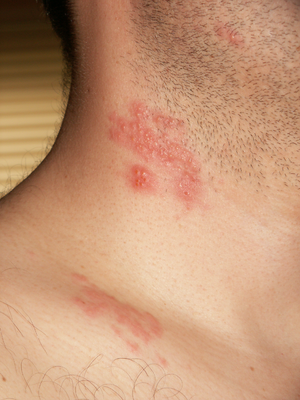Shingles (Herpes Zoster)
Shingles, or herpes zoster, or zoster, is a well-known infectious process which occurs, in most instances, many years after a patient has suffered from chickenpox. The varicella zoster virus, which causes chickenpox, remains dormant in the human body for several years or decades and may lead to the painful skin condition of shingles.

Zoster and genital herpes not the same
The varicella zoster virus which causes chickenpox and shingles is of the herpes virus family; but it is not the same pathogen which leads to genital herpes which is a sexually transmitted disease. Nevertheless, antiviral drugs such as acyclovir, valacyclovir, and famciclovir, which are useful in the management of genital herpes are also the recommendation for treatment of herpes zoster. These agents reduce the duration and severity of herpes zoster, and they alleviate exacerbations of genital herpes.
However, none of these antiviral medications is curative of either disease. But symptoms of herpes zoster will resolve over a period of several weeks whereas exacerbations and remissions of genital herpes will continue for the lifetime.
Shingles affects one million people in the United States every year. One in three adults is likely to have an episode of this condition. Unlike childhood chickenpox which confers lifelong immunity to that condition after only one occurrence, a bout of herpes zoster does not make the patient immune to further occurrences of it. Hence, adults who develop herpes zoster may have several more bouts of this medical condition (Centers for Disease Control).
Shingles occurs when the varicella zoster virus follows a nerve to the skin, and this results in pain, tingling, itching, and, 1 to 14 days later, the appearance of skin lesions which resemble chickenpox. The burning or shooting pain and other symptoms manifest on one side of the face or body.
Whereas herpes zoster tends to occur in elderly people, it can take place in anyone who has recovered from chickenpox earlier in life. The risk for the development of shingles especially rises at the age of 50; however, the current recommendation is that everyone who is at least 60 years of age, and for whom there is no contraindication, take the vaccine to protect against shingles.
Risk factors for shingles
Patients with immune system compromise are at risk for the development of shingles too, and this includes patients with human immunodeficiency virus infection, those on long term corticosteroid therapy, and people who receive immunosuppressive therapy after receipt of an organ transplant. Naturally, elderly people will be at risk because their immune systems do not function as well as those of young people. And patients who receive cancer chemotherapy will have additional risk for herpes zoster.